Related Research Articles
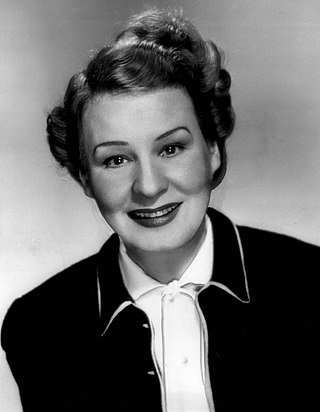
Shirley Booth was an American actress. One of 24 performers to achieve the Triple Crown of Acting, Booth was the recipient of an Academy Award, two Primetime Emmy Awards and three Tony Awards.
Tales of Fatima is an old-time radio transcribed show that was broadcast on CBS from January 8, 1949, to October 1, 1949.
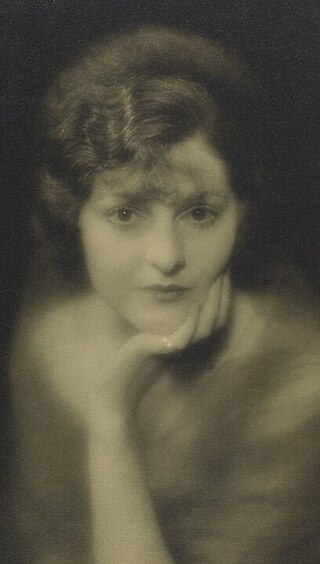
Eleanor Audley was an American actress with a distinctive voice and a diverse body of work. She played Oliver Douglas's mother, Eunice Douglas, on the CBS sitcom Green Acres (1965–1969), and provided Disney animated features with the voices of the two iconic villains: Lady Tremaine in Cinderella (1950), and Maleficent in Sleeping Beauty (1959). She had roles in live-action films, but was most active in radio programs such as My Favorite Husband as Liz Cooper's mother-in-law, Mrs. Cooper, and Father Knows Best as the Anderson family's neighbor, Mrs. Smith. Audley's television appearances include those in I Love Lucy, The Dick Van Dyke Show, Mister Ed, Hazel, The Beverly Hillbillies, Pistols 'n' Petticoats, and My Three Sons.
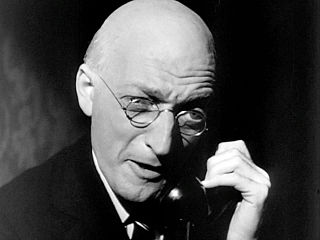
Everett H. Sloane was an American character actor who worked in radio, theatre, films, and television.

High Tor is a 1936 play by Maxwell Anderson. It received the New York Drama Critics' Circle Award for Best Play of the 1936–37 season. Twenty years after the original production, Anderson adapted it into a television musical with Arthur Schwartz.
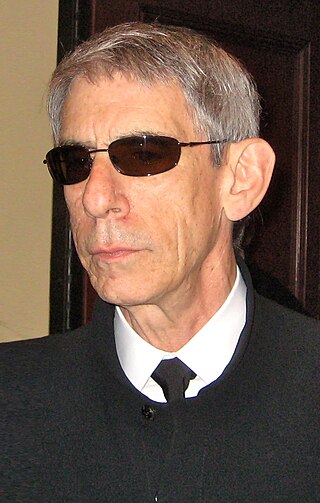
Richard Jay Belzer was an American actor, comedian, and author. He was best known for his role as BPD Detective, NYPD Detective/sergeant and investigator John Munch, whom he portrayed for 23 years in the NBC police drama series Homicide: Life on the Street, Law & Order: Special Victims Unit and several guest appearances on other series.

Homer Durward Kirby, was an American television host and announcer. He is best remembered for The Garry Moore Show in the 1950s and Candid Camera, which he co-hosted with Allen Funt from 1961 through 1966.
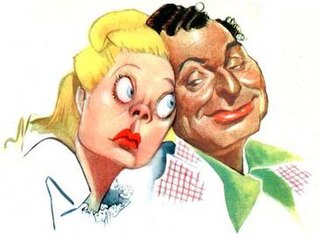
The Phil Harris-Alice Faye Show, was a comedy radio program which ran on NBC from 1948 to 1954 starring Alice Faye and Phil Harris. Harris had previously become known to radio audiences as the band-leader-turned-cast-member of the same name on The Jack Benny Program while Faye had been a frequent guest on programs such as Rudy Vallée's variety shows. After becoming the breakout stars of the music and comedy variety program The Fitch Bandwagon, the show was retooled into a full situation comedy, with Harris and Faye playing fictionalized versions of themselves as a working show business couple raising two daughters in a madcap home.

Easy Aces is an American serial radio comedy (1930–1945). It was trademarked by the low-keyed drollery of creator and writer Goodman Ace and his wife, Jane, as an urbane, put-upon realtor and his malaprop-prone wife. A 15-minute program, airing as often as five times a week, Easy Aces did not draw as strong ratings as other 15-minute serial comedies such as Amos 'n' Andy, The Goldbergs, Lum and Abner, or Vic and Sade but its unobtrusive, conversational, and clever style, and the cheerful absurdism of its storylines, built a loyal enough audience of listeners and critics alike to keep it on the air for 15 years.
The Philco Television Playhouse is an American television anthology series that was broadcast live on NBC from 1948 to 1955. Produced by Fred Coe, the series was sponsored by Philco. It was one of the most respected dramatic shows of the Golden Age of Television, winning a 1954 Peabody Award and receiving eight Emmy nominations between 1951 and 1956.

William Henry "Will" Wright was an American actor. He was frequently cast in Westerns and as a curmudgeonly and argumentative old man. Over the course of his career, Wright appeared in more than 200 film and television roles.

The Kraft Music Hall was a popular old-time radio variety program, featuring top show business entertainers, which aired first on NBC radio from 1933 to 1949.

Ford Theatre, spelled Ford Theater for the original radio version and known, in full, as The Ford Television Theatre for the TV version, is a radio and television anthology series broadcast in the United States in the 1940s and 1950s. At various times the television series appeared on all three major television networks, while the radio version was broadcast on two separate networks and on two separate coasts. Ford Theatre was named for its sponsor, the Ford Motor Company, which had an earlier success with its concert music series, The Ford Sunday Evening Hour (1934–42).
"Business School" is the seventeenth episode of the third season of the American version of The Office and the show's 45th overall. In the episode, Michael Scott is invited by Ryan Howard to speak to his business school class. When many of the students question the usefulness of paper in a computerized world, Michael attempts to inform the class of how essential paper is. Meanwhile, a bat becomes trapped in the office, leading Dwight Schrute on a mission to protect the employees.
The Big Story is an American radio and television crime drama which dramatized the true stories of real-life newspaper reporters. The only continuing character was the narrator, Bob Sloane.

Elliott Lewis was an American actor, writer, producer, and director who worked in radio and television during the 20th century. He was known for his ability to work in these capacities across all genres during the golden age of radio, which earned him the nickname "Mr. Radio". Later in life, he wrote a series of detective novels.
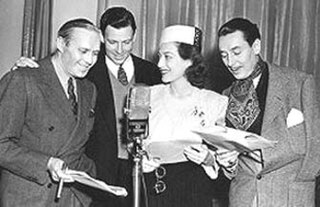
The Screen Guild Theater is a radio anthology series broadcast from 1939 until 1952 during the Golden Age of Radio. Leading Hollywood stars performed adaptations of popular motion pictures. Originating on CBS Radio, it aired under several different titles including The Gulf Screen Guild Show, The Gulf Screen Guild Theater, The Lady Esther Screen Guild Theater and The Camel Screen Guild Players. Fees that would ordinarily have been paid to the stars and studios were instead donated to the Motion Picture Relief Fund, and were used for the construction and maintenance of the Motion Picture Country House.

Matinee Theater is an American anthology series that aired on NBC during the Golden Age of Television, from October 31, 1955, to June 27, 1958. Its name is often seen as Matinee Theatre.
Academy Theatre is an American drama anthology television series that aired on NBC from July 25, 1949, to September 12, 1949. It ran for eight weeks as the summer replacement for Chevrolet on Broadway.
Plymouth Playhouse, also known as ABC Album, is a half-hour American television anthology series that aired in 1953 to present "pilot program concepts."
References
- 1 2 3 4 5 6 7 8 9 10 11 12 Terrace, Vincent (September 2, 2015). Radio Programs, 1924-1984: A Catalog of More Than 1800 Shows. McFarland. pp. 152–153. ISBN 978-1-4766-0528-9 . Retrieved November 4, 2023.
- 1 2 "Radio Guide". The Altoona Tribune. August 2, 1949. p. 11. Retrieved November 5, 2023– via Newspapers.com.
- ↑ "Radio and Television: CBS Plans 'Inside USA' as Half-Hour Video Revue on Alternate Thursdays in Fall" . The New York Times. June 16, 1949. p. 58. Retrieved November 4, 2023.
- ↑ "In New York City . . ". Variety. June 15, 1949. p. 34. Retrieved November 6, 2023.
- 1 2 3 Adams, Val (July 31, 1949). "Some Summer Shows: NBC Tries Its Hand at 'Package' Units With Only Indifferent Results" . The New York Times. p. X 7. Retrieved November 4, 2023.
- 1 2 Tucker, David C. (March 26, 2015). Shirley Booth: A Biography and Career Record. McFarland. p. 55. ISBN 978-0-7864-8205-4 . Retrieved November 5, 2023.
- ↑ "Hogan's Daughter". Variety. July 13, 1949. p. 31. Retrieved November 6, 2023.
- 1 2 Crosby, John (July 13, 1949). "New Comedy Isn't Funny". Tampa Bay Times. p. 24. Retrieved November 6, 2023– via Newspapers.com.
- ↑ "Sunday, May 17". Ross Reports. May 10, 1953. p. 10. Retrieved November 5, 2023.
- 1 2 "Television Followup". Variety. May 20, 1953. p. 26. Retrieved November 5, 2023.